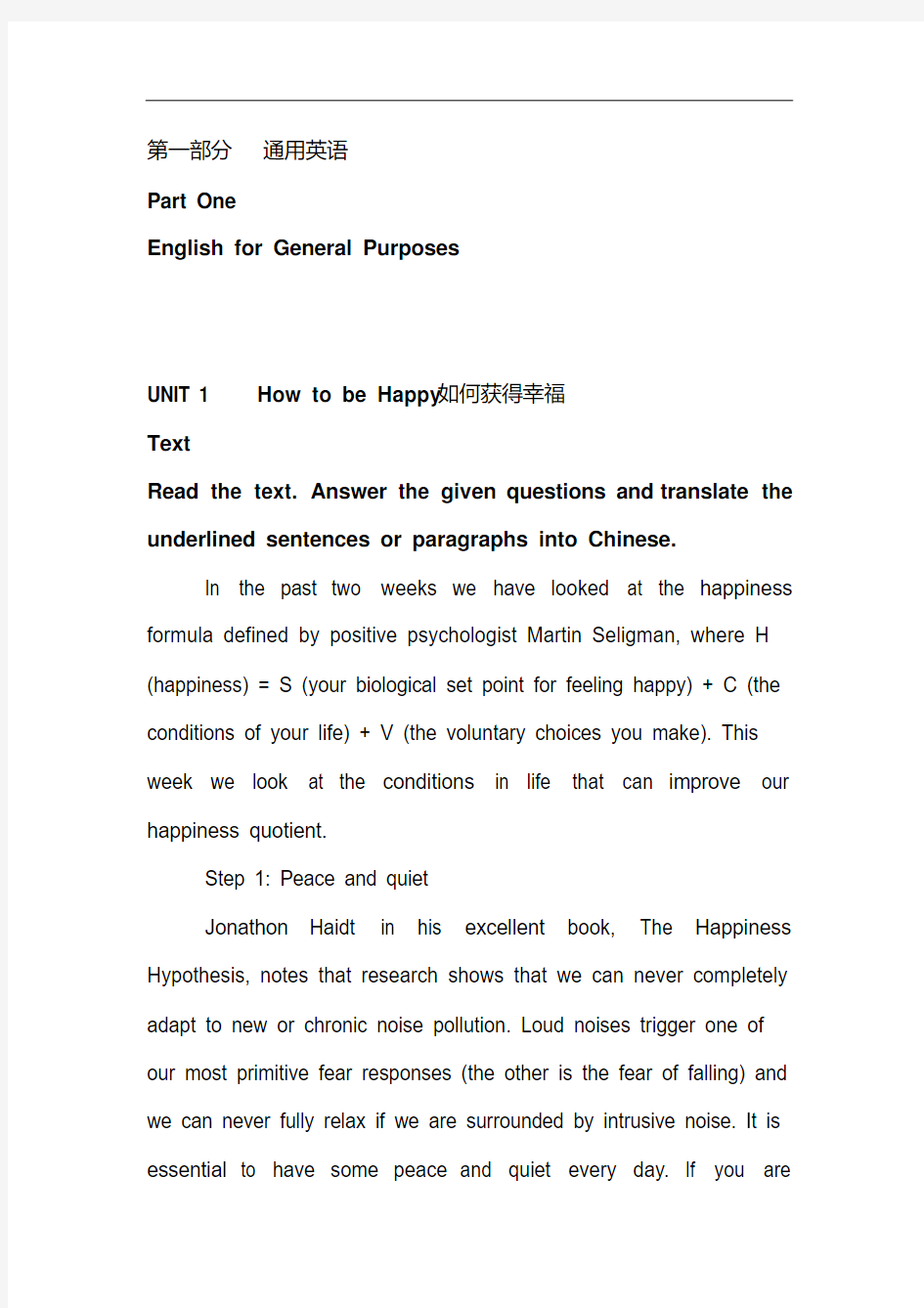中石油、中石化职称英语考试参考用书

- 1、下载文档前请自行甄别文档内容的完整性,平台不提供额外的编辑、内容补充、找答案等附加服务。
- 2、"仅部分预览"的文档,不可在线预览部分如存在完整性等问题,可反馈申请退款(可完整预览的文档不适用该条件!)。
- 3、如文档侵犯您的权益,请联系客服反馈,我们会尽快为您处理(人工客服工作时间:9:00-18:30)。
第一部分通用英语
Part One
English for General Purposes
UNIT 1 How to be Happy如何获得幸福
Text
Read the text. Answer the given questions and translate the underlined sentences or paragraphs into Chinese.
In the past two weeks we have looked at the happiness formula defined by positive psychologist Martin Seligman, where H (happiness) = S (your biological set point for feeling happy) + C (the conditions of your life) + V (the voluntary choices you make). This week we look at the conditions in life that can improve our happiness quotient.
Step 1: Peace and quiet
Jonathon Haidt in his excellent book, The Happiness Hypothesis, notes that research shows that we can never completely adapt to new or chronic noise pollution. Loud noises trigger one of our most primitive fear responses (the other is the fear of falling) and we can never fully relax if we are surrounded by intrusive noise. It is essential to have some peace and quiet every day. If you are
unfortunate enough to live somewhere noisy, persist with complaining to your local council. Additionally, try wearing wax earplugs to have some respite. If you need your TV, radio or music up loud, wearing headphones demonstrates altruism to your neighbours, which will make you and them feel good.
Step 2: Relationships
This is the most important of all the external conditions that can improve your happiness quotient. Often our deepest sources of unhappiness are found in poor relationships with others. A cruelly conflictual relationship with a partner or lover leaves us feeling betrayed and abandoned. A relationship with our parents or children which is not based on compassionate, unconditional regard creates isolation and misery. When faced with such relationships, the most positive thing we can do is to either mend the relationship by confronting what is going wrong or learn to move on.
Step 3: Share
If you have discovered conditions or choices in life that have significantly improved your wellbeing, remember to share them with friends. Passing on what works is essential to improve the wellbeing of our own and others.
1. What's the happiness formula according to the passage?
2. Why can we never completely adapt to new or chronic
noise pollution?
3. How could we make both ourselves and the neighbors feel good?
4. Where does the unhappiness come from?
5. What is the positive way to face with the cruelly conflictual relationship?
Exercises
A. Translate the following sentences into English.
1.吵闹的邻居的确对我们家庭不和(domestic upset)有很大影响。
2.在职场上,如果一个同事对我们表示威吓的话,会造成
难以言表的抑郁情绪(unwretchedness)。
3.我们不可能适应这种敌对关系,这种不良的人际关系会
损害身心健康。
4.如果这种坏情绪长时间留在人们的心里,会让人陷入无
法解决的恶性心理困境。
5.我们不应当回避这些问题,而是要正确面对它们。
B. Read the text and translate it into Chinese.
There are many benefits to being happy. Happier people tend to be healthier, live longer and eam more. They also tend to volunteer more, be better at relationships and smile more of what
Duchenne" or genuine smiles. What is less well psychologists call “
